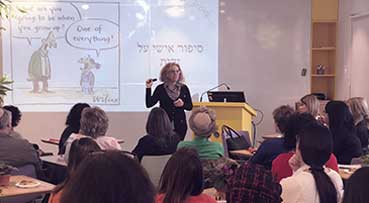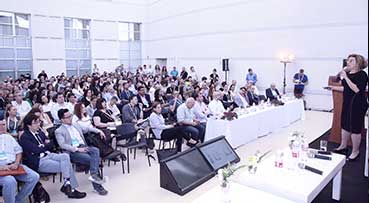The need to understand how the new workplace should shape public policy and legislation is now even more urgent as courts are dealing with the new ecosystem based on old labor laws. It is probably time we team up to ask the right questions and help shape the world of work in a way that would support careers, organizations as well as society.
The changing world of work is already a central topic in strategy conversations and leadership gatherings. Typical keynotes center around the implications for organizations, jobs, managers, access to talent and more. But in the last few months invitations seem to be coming in from a new and quite welcome direction, that of public policy officials, legislators, government agencies as well as academics.
We now have many different types of employment options ranging from full time salaried employee to self-employed business owner and many options in between. Portfolio careers, mixing and matching between these options, are on the rise. And if you’re now thinking “doesn’t work for me”, think again! The number of salaried positions is not likely to grow as companies gain access to talent when they need it where they need it via multiple “on tap” channels. Many mid life careers will need to shift to include some form of non-salaried work. According to Gallup this is already happening with workers over 50 being one of the fastest growing groups of entrepreneurs in the U.S.
What has changed?
But here’s what’s different about these new types of businesses. Today’s new business doesn’t have to have to physical office, most of them don’t have staff on payroll and most probably don’t even carry business cards. In many cases, the target market is in the cloud and has no boundaries of time or place. The business can provide products or services directly to the end user through an internet platform. So our new era entrepreneur can open a “virtual store” of sorts, where he or she sell products, services or even their time or use of their property. This shift in what a business looks like is transforming whole industries, from cabs and cleaning services to medical and legal consultation. There are almost no barriers to entry, almost anyone can start their own venture with a minimal budget, as long as they set up to connect to a paying customer. In this virtual cloud all you have to do is be there and if you’re selling something someone needs, your customers will find you.
The workers of this new world – freelancers, temps, part times, subcontractors, consultants and various experts – can also work with organizations, sometimes with more than one at the same time, and on a non-permanent basis. This world also provides opportunity for those, who previously had a harder time participating in the job market. These include workers who could not commit to a full time job with fixed hours and a specific location and also those who left salaried positions and are finding it difficult to return to the job market. There is no doubt society will benefit from these workers’ participation in the new world of work. Sometimes, all that is needed, is some startup assistance and support on questions such as how to start such a business, to set up shop on the web, the finances and legal infrastructure involved. There is no place today where these tools and skills are being taught and even those who already understand they need to get ready have a hard time knowing how to go about it.
This is the future, and the numbers speak for themselves. If 25 years ago only 6% of the US economy was self employed, today we are at more than 30% and the proportion continues to grow. There is a new name emerging, the 1099 economy, named after the US 1099 tax form which defines you as your own employer. And yet public policy and labor laws are still not adapting to this new environment.
We need minimum rights regardless of form of employment
Many of the world labor laws and public policies are struggling to reconcile between what was and what is emerging. Are those selling their services via web applications employees or service providers? The latest California court ruling on the case of Uber rests on existing labor tests. The question is, are these the right tests for the new world of work? If nothing else, this will most probably furthers the much needed public debate on these questions.
That is not to say that any new public policy should discount all the progress labor laws have achieved over decades for the benefits of employees including in various elements of healthcare, retirement, sick leave, time off, maternity benefits, overtime, minimum wages and others, depending on where you are in the world. These are important accomplishments and we should not assume that adapting to the new ways of work should reverse these accomplishments. But we can also not assume that they should stay as is and not adapt with the changes.
To do that, public policy should proactively and boldly lead a conversation on minimum workers’ rights regardless of the form of employment. Until we reach that new equilibrium, some of the new organizations are offering their people the choice of status, between employees and service providers.
Some questions we should be asking
How do we prepare people to operate in this world of work? What kinds of tools and capabilities should be available to make it easier for a Business of One. How do we help the “immigrants” into the new world of work learn and adapt? How can we remove barriers for salaried employees to become self employed or create portfolio careers? How do we help them develop and second or even third career beyond what we once considered retirement?
The new modes of work will move forward and evolve whether you like them or not. They cannot be ignored simply by sticking with what was. We are not even close to addressing these questions but in the next few years we will have to work through them. Innovative public policy will have to step up and respond to the changes and create the education system, the ecosystems, the measurements and the labor legal environments suited for the new decades. And all parties involved – the workers, the organizations and the legislature – will need to work together to adapt so that we create a better world of work.

![large-AX1A2125-2[1] large-AX1A2125-2[1]](https://niritcohen.com/wp-content/uploads/elementor/thumbs/large-AX1A2125-21-pnzedcs72atx5aeurqytqdiihxixlq02re9mlz805s.jpg)






